Communicating is one of the biggest challenges for the more than 21 million Americans who are hard of hearing or deaf, but fortunately there are all kinds of devices and systems available today to help the hearing impaired. This article focuses on two categories of devices designed to make daily living easier for the hard of hearing — amplified phones and alerting / notification systems.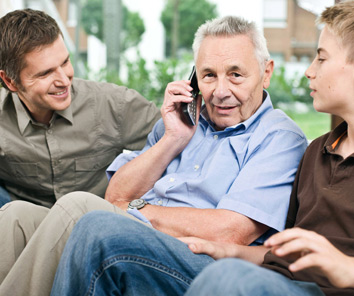
Amplified Phones for the Home
Talking on the household phone can be extremely frustrating for people with hearing loss. Today’s wide selection of amplified phones for the hearing impaired offer a variety of features that address just about every need, including large keypads, adjustable volume and tone, extra loud ringers and hearing aid compatibility. Use this checklist to pick the phone that best fits your needs:
1) Amplification Level – Phones for the hard of hearing have three levels of amplification.  Select the one that boosts volume adequately for you.
- Mild Hearing Loss (20 – 30dB) – For listeners who strain to hear phone conversations and find that they are missing words.
- Moderate Hearing Loss (30 – 45dB) – For listeners who find that they frequently ask the other party to repeat themselves.
- Severe Hearing Loss (50 – 60 dB) – For listeners who have so much difficulty hearing phone conversations, they often avoid using the phone.
2) Portability — Consider the user’s mobility and lifestyle when choosing between a corded, cordless and hands-free phone, as well as where the phone will be located in the home.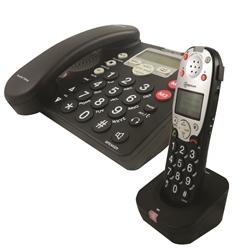
- Corded amplified phones have a large base that is bulkier than a cordless phone but typically offer a large, easy-to-read keypad as well as a bigger caller ID and phone number display. Many corded models, like the Geemarc AMPLI455 Amplified Telephone, have other built-in features like an answering machine and speakerphone.
- Cordless amplified phones appeal to people who like to walk around while they talk. Some amplified phone systems like the Amplicom PowerTel 7 Series have a corded base that is “expandable†so you can have up to four additional PowerTel 701 cordless phones in other rooms.
- Hands-free phones are ideal for people with limited mobility or some degree of paralysis. For example, the extra loud remote-controlled Fortissimo by Clarity features a voice-activated speakerphone and optional accessories for hands-free control.
Â
3) Hearing Aid Compatibility — Most amplified phones for the hard of hearing are hearing aid compatible, but many newer cordless amplified phones, like those made by Clarity, are also TIA-1083 compliant (a performance standard that greatly reduces the interference or audible “buzzâ€Â that hearing aid wearers often experienced when using a cordless phone).
Â
4) Other Handy Features
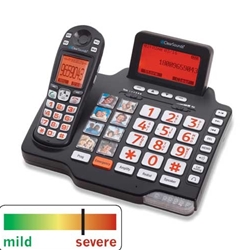 Visual Aides – For users with vision loss, there are amplified phones with bright visual ringers to signal incoming calls. Some models have extra large, back-lit keypads and large LCD displays to make dialing easier.
Visual Aides – For users with vision loss, there are amplified phones with bright visual ringers to signal incoming calls. Some models have extra large, back-lit keypads and large LCD displays to make dialing easier.- Photo Address Book — Some amplified phones have speed dial buttons that you can customize with photos of family and friends.
- Bluetooth Connection — Wirelessly connect your cell phone to your amplified phone via Bluetooth. This is a good feature for homes without a landline connection or for use in a nursing or assisted living facility.
- Vibrating Wristshaker — Acts as a phone ring alert or remote answering device.
- Multiple User Settings – Automatically adjusts volume and tone settings for each user in the household; available only in the Amplicom PowerTel 7 Series.
- Emergency Dialer – Dials preprogrammed emergency contacts when the emergency button is pressed.
Alerting / Notification Systems
In addition to missing out on all or parts of conversations, people with hearing loss often discover that they’re simply not hearing important everyday sounds like telephones, doorbells and alarm clocks. Fortunately, there are many notification systems and signalers designed to help people with hearing loss live and function normally at home or when traveling, including these popular alerting systems:
Â
Visual Doorbell Alerts
- Strobe and Sound Signaler — The Nutone Wireless Doorbell notifies users when someone is at the door using both a flashing strobe signaler and audible chime. Plugs into any wall outlet and has a range of up to 100 feet.
- Flashing Lamp Signaler – The Sonic Alert Universal Sound Signaler flashes the lamp of your choice to alert for ringing doorbells, telephones, kitchen timer, babies crying, etc.
Telephone Alerts
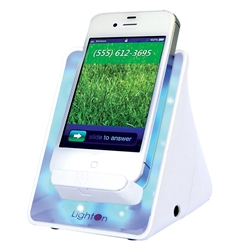 Landline Phone Signaler – The Telestrobe Telephone Ring Signaler flashes a bright strobe light when a landline telephone rings. The Dakota Alert Telephone Signaler flashes a bright LED light and sounds an extra loud ringer (up to 95 dB).
Landline Phone Signaler – The Telestrobe Telephone Ring Signaler flashes a bright strobe light when a landline telephone rings. The Dakota Alert Telephone Signaler flashes a bright LED light and sounds an extra loud ringer (up to 95 dB).- Mobile Phone Flashing Signaler – The Dreamzon LightOn cradle holds your mobile phone and flashes a bright LED light when a new text message or call is received.
Â
Vibrating Alarm Clocks
- Super Loud + Bedshaker — The Bellman Vibrating Alarm Clock Classic wakes hard of hearing users with a powerful bedshaker, high-intensity LED lights and a built-in audible alarm that increases in sound volume up to 100dB.
- Loud + Vibrating Wristband – The Amplicom TCL Vibe Digital Dual Alarm Clock features a loud audible alarm (75dB) and a silent vibrating wristband alarm that can be set for different times and can be used to waken one or two sleepers on varied schedules.
Smoke and Carbon Monoxide Alert
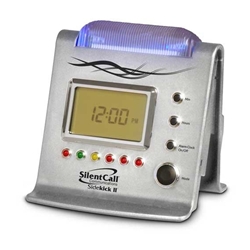 Strobing Light + Bedshaker – Create a fire and CO alerting system with a Silent Call Sidekick II Receiver with Strobe Light and the fire alarm transmitter and the carbon monoxide transmitter accessories.  If smoke or CO is detected, the distinctive LEDs light up on the receiver. For protection while sleeping, add a bedshaker to receive vibrating alerts.
Strobing Light + Bedshaker – Create a fire and CO alerting system with a Silent Call Sidekick II Receiver with Strobe Light and the fire alarm transmitter and the carbon monoxide transmitter accessories.  If smoke or CO is detected, the distinctive LEDs light up on the receiver. For protection while sleeping, add a bedshaker to receive vibrating alerts.
More Help for the Hearing Impaired
An amplified phone for the home and one or more of these alerting / notification systems can greatly improve everyday life for someone with hearing loss. There are many other devices and systems available to help hard of hearing people adapt to their environment, including TV listening systems and personal amplifiers. Oftentimes, these devices prove to be useful to other members of the household as well.




Roger
Do you have devices alarm for the deaf and hard of hearing to alert them when sump pump stops working?